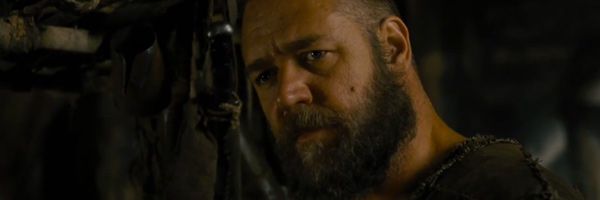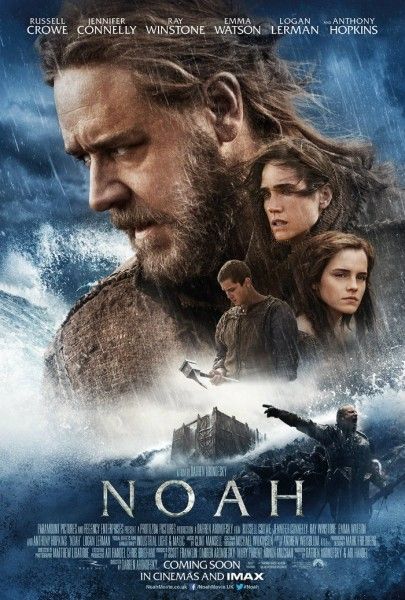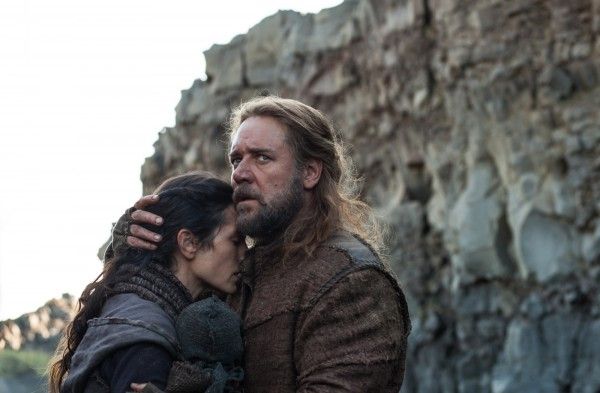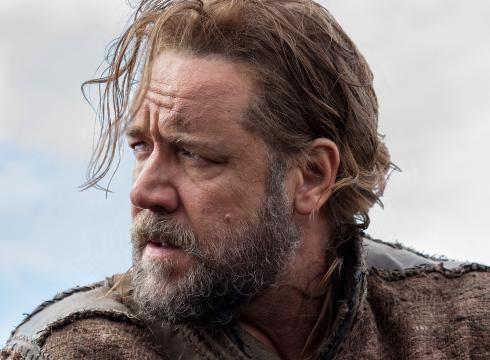During a break in filming on Darren Aronofsky's biblical epic, Noah, Russell Crowe, who plays the eponymous figure, stops by for a chat with me and my fellow journalists who are visiting the set. In one of the many ways the film will defy expectations, he's not wearing a robe and sandals. He's dressed in scraps of leather, furs, and something that doesn't resemble any particular time period, but conveys the pre-history of the tale. As Crowe tells us, eschewing the traditional representation of the biblical story is one of the reasons he wanted to be a part of the project.
During our conversation, we also talked about spending so much time in the rain, what else about Aronofsky's vision that attracted him to the project, what he learned in his research, shooting in Iceland, and more. Hit the jump to check out the Russell Crowe interview, click here to read my full set visit report, and click here to check out a new featurette. Noah opens March 28th.
Are you enjoying spending so much time in the rain?
RUSSELL CROWE: Yeah, the job's fantastic. When it first comes out, it looks like fireworks. You have that two blissful seconds where you're swallowed by the beauty and awe of it…and then you get wet. It kind of goes downhill from there. So that why I just keep in my mind every time before I take I just look up and look at the beauty there.
What do you do in this one that you've never done before?
CROWE: Well, I've never gone for a swim in about 35 degrees off the coast of Iceland before. That was a very interesting experience. We found out later that night that it was the most dangerous beach in Iceland. Every year, people just get taken off the beach. That's why they were paramount on safety.
What was it about Darren's vision that made you so interested in this?
CROWE: It's funny. He called and said, "I'm going to tell you the name of the project I need to do with you. And once I've told you the name, I don't want you to comment. I just want you to allow me to make you two promises." I said, "Right." He said, "The name of the project is 'Noah'. Now the two promises: First promise is you never have to wear a pair of sandals. And the second promise is that never at any stage will I require you to stand at the bow of the ship, flanked by a giraffe and an elephant." So I was working in New Orleans at the time, so he came down and we had a couple days of talking about it, I read it, and I also saw all the pre-viz ideas he had for it, so it was clear it was going to be spectacular.
It seems like a daunting task to take on this kind of character and do it in a new way in a new story.
CROWE: That's kind of what I like about it though. Everybody has images in their mind when they hear "Noah", and none of this matches up to that. None of it at all. There's a lot of reading, actually, about pre-diluvial human life, and it's quite enlightening, actually—what's been discovered by archeologists over time.
Have you researched beyond the bible what theological scholars say about Noah or different interpretations?
CROWE: Yes, all of it. It's very interesting. I had some people around the other night and they're both ministers, actually. They've worked in Africa stuff like that. And they really wanted to talk about their version of Noah. The Judeo-Christian Noah. And I really want to get into the conversation because I've been doing so much other reading about Noah, but at the same time, "I don't really want to bug you," but at the same time, if you're like me, that's the only version you know. Every single ancient religious text has Noah. Every major religion shares stories up until Noah.
What kind of Noah are you?
CROWE: A wet one. [laughs]
There's a lot of talk about how the size of the ark is exactly how it's described in the Bible, so there's a lot of accuracy, but you're saying this isn't like the one we know from the Bible. Is it the look that makes it so different, or is it where this character goes on this journey?
CROWE: The thing is if you actually read the Bible, you can see there's a whole lot more information in there than the way we interpret the Bible. Because there are single lines in the Bible where if you just take them at face-value, they don't make any sense whatsoever in the world we see, we know, and we understand. That's the major twist with Darren. This world that exists pre-flood is not the dusty, sandy, Middle-eastern world of the Judeo-Christian understanding. It's broader than that.
What kind of dialogue is there in this? It's Biblical English?
CROWE: We kind of discussed that. It's sort of a wild thing to make the assumption. There's an arrogance either way. There's an arrogance if you think you've got something correct, and there's an arrogance if you don't even address it. So we kind of stuck to the middle of it, and I would say in a way we've gone for what I would say is clarity rather than exactness, because that's impossible.
So because Noah has spent ten years of life building the arc, is he more enlightened than most people?
CROWE: That's a good question because still at this point in the story is he having communication with the creator or has he just gone mad? But you'll see from the beginning of the movie that he's made certain decisions about how he's lived his life. I'm trying to avoid saying the word "pure", but he has a simpler understanding of how Man and Earth, and Man and Creator, are supposed to be.
What's been the most challenging aspect of filming so far?
CROWE: Running naked on the beach in 29.6 degrees for a whole day, and getting so cold. So freaking cold. So it was interesting. It was funny too because all of us, we experienced so many beautiful things in Iceland. It was a magnificent place. Beautiful place to shoot. We were basically along the whole journey of lava. We were sort of on top of volcanoes and glaciers and stuff. And then we were on glacial, volcanic planes, and then the ocean where the lava meets the ocean. So the day I was lying around naked, there were these incredible little stones, and these [gestures to the recreated versions on set] aren't very good examples because they're still very sharp. Down by the beach, the stones are tiny and they're perfectly round. And those little stones will get in places…I found it very odd, the mathematics of how they get there and how they stay there for days. No many how many showers or whatever. But we also found some incredible shapes too. Some of them I brought back to my kids. You have the crust of the previous eruption and the glacier has formed over it, and it's erupted again, so the molten rock has gone through the glacier, and it looks amazing. It looks like plastic. And you pick it up, and it's not plastic. It's got weight to it. Iceland is fascinating; really an amazing place to visit, and great for the film to go there.




